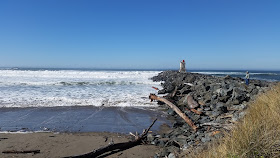Little Altars Everywhere by Rebecca Wells
Fiction
1996 Harper Collins (first published in 1992)
Finished in December 1997
Rating: 4.5/5 (Very Good!)
Publisher's Blurb:
"We are swinging high, flying way up, higher than in real life. And when I look down, I see all the ordinary stuff--our brick house, the porch, the tool shed, the clothesline, the chinaberry tree. But they are all lit up from inside so their everyday selves have holy sparks, they'd go and kneel in front of them and pray and just feel good. Somehow the whole world looks like little altars everywhere."Little Altars Everywhere is a national bestseller, a companion to Rebecca Wells's celebrated novel Divine Secrets of the Ya-Ya Sisterhood. Originally published in 1992, Little Altars introduces Sidda, Vivi, the rest of the spirited Walker Clan, and the indomitable Ya-Yas. It is now available for the first time in hardcover.
Told in alternating voices of Vivi and her husband, Big Shep, along with Sidda, her siblings Little Shep, Lulu, Baylor, and Cheney and Willetta--the black couple who impact the Walkers' lives in ways they may never fully comprehend--Little Altars embraces nearly thirty years of life on their plantation in Thorton, Louisiana, where the cloying air of the bayou and a web of family secrets of once shelter, trap, and define an utterly original community of souls.
Who can resist the rich cadences of Sidda Walker and her flamboyant, secretive mother, Vivi? Here, the young Sidda--a precocious reader and an eloquent observer of the fault lines that divide her family--leads us her mischievous adventures at Our Lady of Divine Compassion parochial school and beyond. A Catholic girl of pristine manners, devotion, and provocative ideas, Sidda is the very essence of childhood joy and sorrow.
In a series of luminous reminiscences, we also hear Little Shep's stories of his eccentric grandmother, Lulu's matter-of-fact account of her shoplifting skills, and Baylor's memories of Vivi and her friends, the Ya-Yas.
Beneath the humor and tight-knit bonds of family and friendship lie the undercurrents of alcoholism, abuse, and violence. The overlapping recollections of how the Walker's charming life uncoils to convey their heartbreaking confusion are at once unsettling and familiar. Wells creates an unforgettable portrait and funny attempts to keep reality at arm's length. Through our laughter, we feel their inevitable pain, with a glimmer of hope for forgiveness and healing.
An arresting combination of colloquialism, poetry, and grace, Little Altars Everywhere is an insightful, piercing, and unflinching evocation of childhood, a loving tribute to the transformative power of faith, and a thoroughly fresh chronicle of a family that is as haunted as it is blessed.
My Original Notes (1997):
Excellent! Just as good as Divine Secrets of the Ya-Ya Sisterhood. Made me laugh and cry. What a marvelous author. Interesting device to use different characters' voices for each chapter. Varies the story's point of view. [I must not have encountered this before, but it's very common in the books I read now!] Highly recommend!
My Current Thoughts:
I wish I could remember more about this novel and I no longer own a copy, so I can't glance back and see if I highlighted any passages. Funny that I had never read (or noticed) a book with alternating points of view! I do believe it's time to reread both Divine Secrets of the Ya-Ya Sisterhood (which I talked about here) and Little Altars Everywhere. I think I need to devote an entire month to rereading some of my favorites!






































































